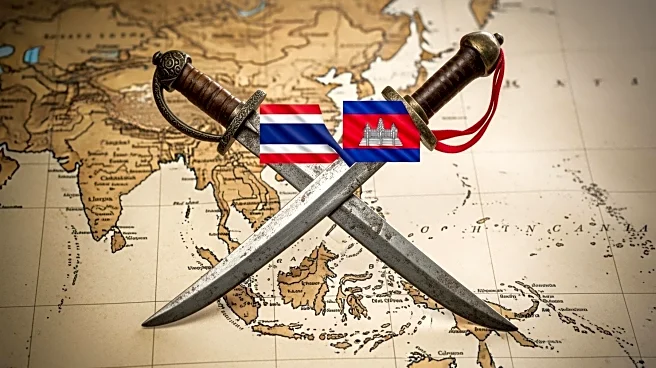What's Happening?
President Donald Trump is set to attend a signing ceremony in Malaysia for a peace agreement between Thailand and Cambodia, aimed at resolving a border dispute that escalated into violence in July. The conflict resulted in several dozen deaths and the
displacement of tens of thousands. Trump played a role by threatening to end tariff negotiations with both countries unless they agreed to a ceasefire, which has tentatively held since then. The agreement, known as the 'Kuala Lumpur Accord,' will be formalized during a meeting of the Association of Southeast Asian Nations (ASEAN). While Trump claims credit for brokering peace, Malaysia has been the primary mediator, hosting negotiations and drafting the terms of the agreement.
Why It's Important?
The peace agreement is significant as it aims to stabilize relations between Thailand and Cambodia, two countries with a history of border disputes. The involvement of President Trump highlights the U.S.'s influence in international diplomacy, particularly in Southeast Asia. The agreement could enhance regional security and economic stability, benefiting ASEAN members and potentially reducing military tensions. Cambodia, with a smaller military, seeks closer ties with the U.S., while Thailand, a U.S. treaty ally, remains cautious. The peace deal may also impact U.S. foreign policy, showcasing Trump's diplomatic efforts and potentially bolstering his international reputation.
What's Next?
Following the signing of the peace agreement, Thailand and Cambodia will focus on implementing its terms, including the withdrawal of heavy weapons from the border and coordinated demining efforts. An ASEAN observer team will be dispatched to monitor compliance. The two countries plan to conduct a border survey and reconvene in January to discuss land occupation adjustments. The presence of President Trump at the ceremony is expected to lend legitimacy to the agreement, although ongoing negotiations and regional diplomacy will be crucial in maintaining peace.
Beyond the Headlines
The peace agreement may have broader implications for regional diplomacy, highlighting Malaysia's role as a mediator and the influence of other countries like China. The historical context of the border dispute, rooted in colonial-era treaties, underscores the complexity of territorial conflicts in Southeast Asia. The agreement could serve as a model for resolving similar disputes in the region, promoting stability and cooperation among ASEAN members.















